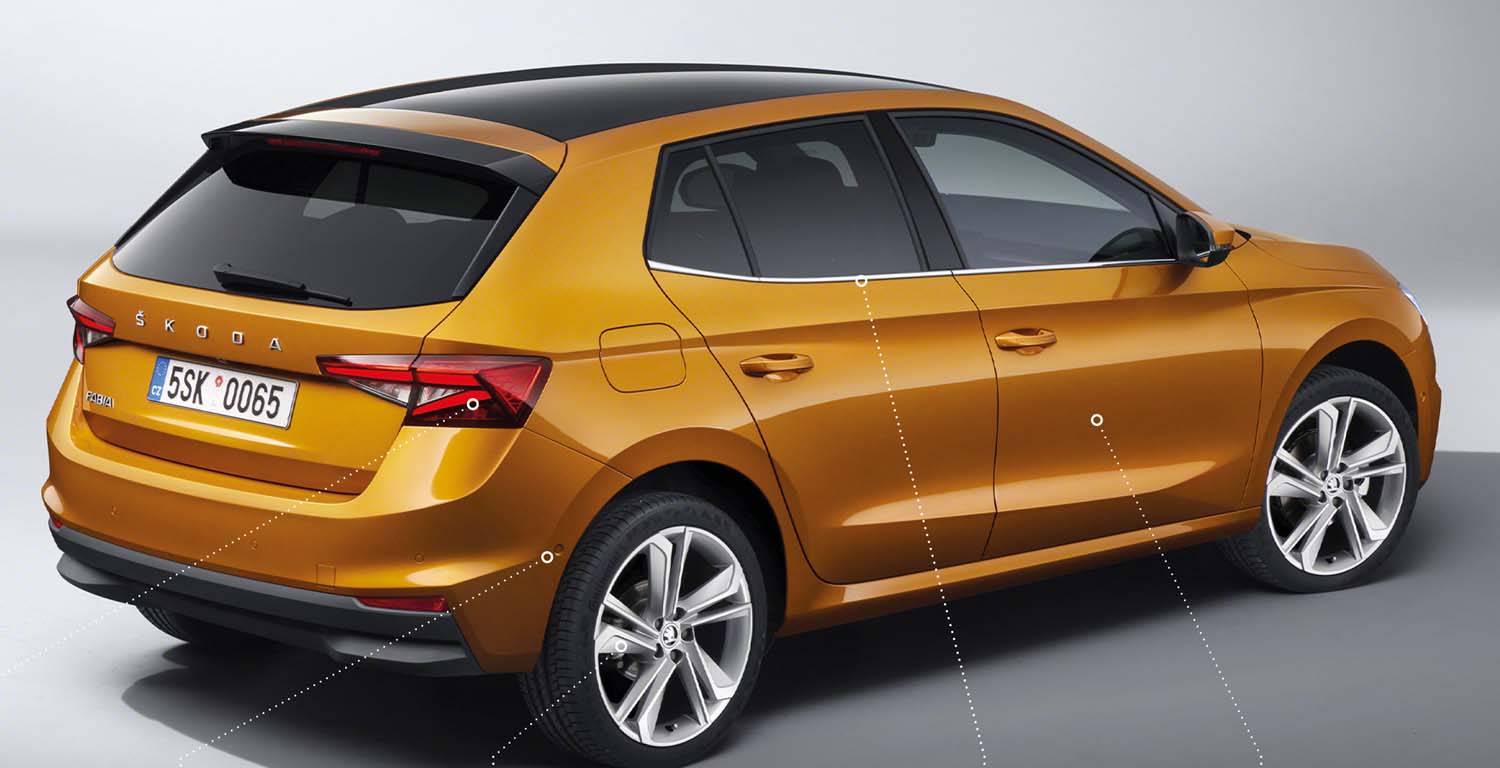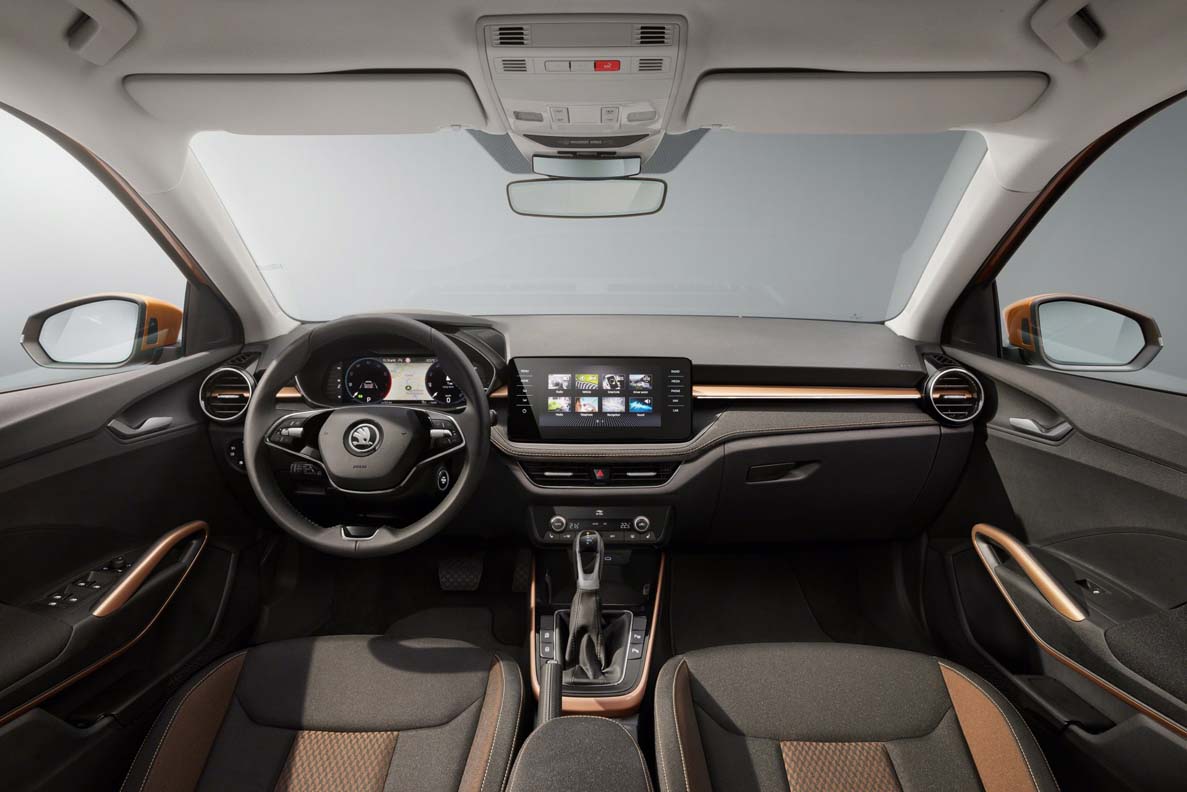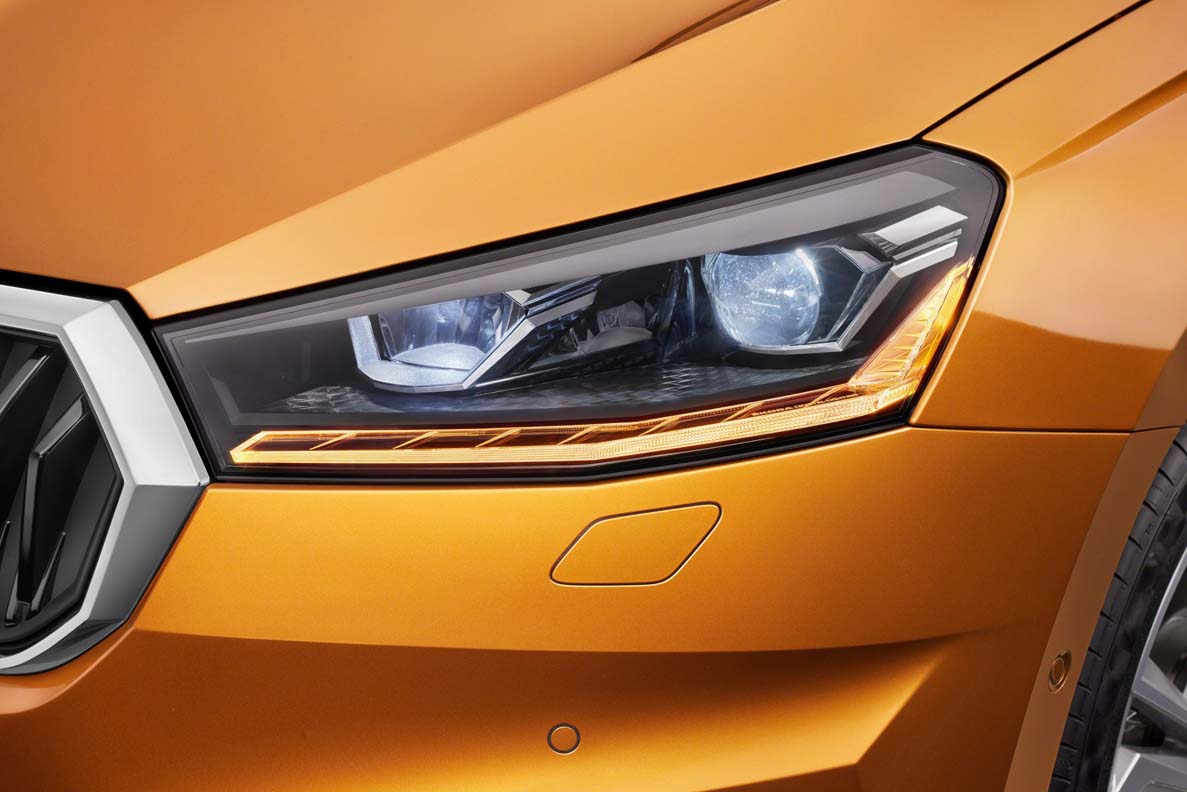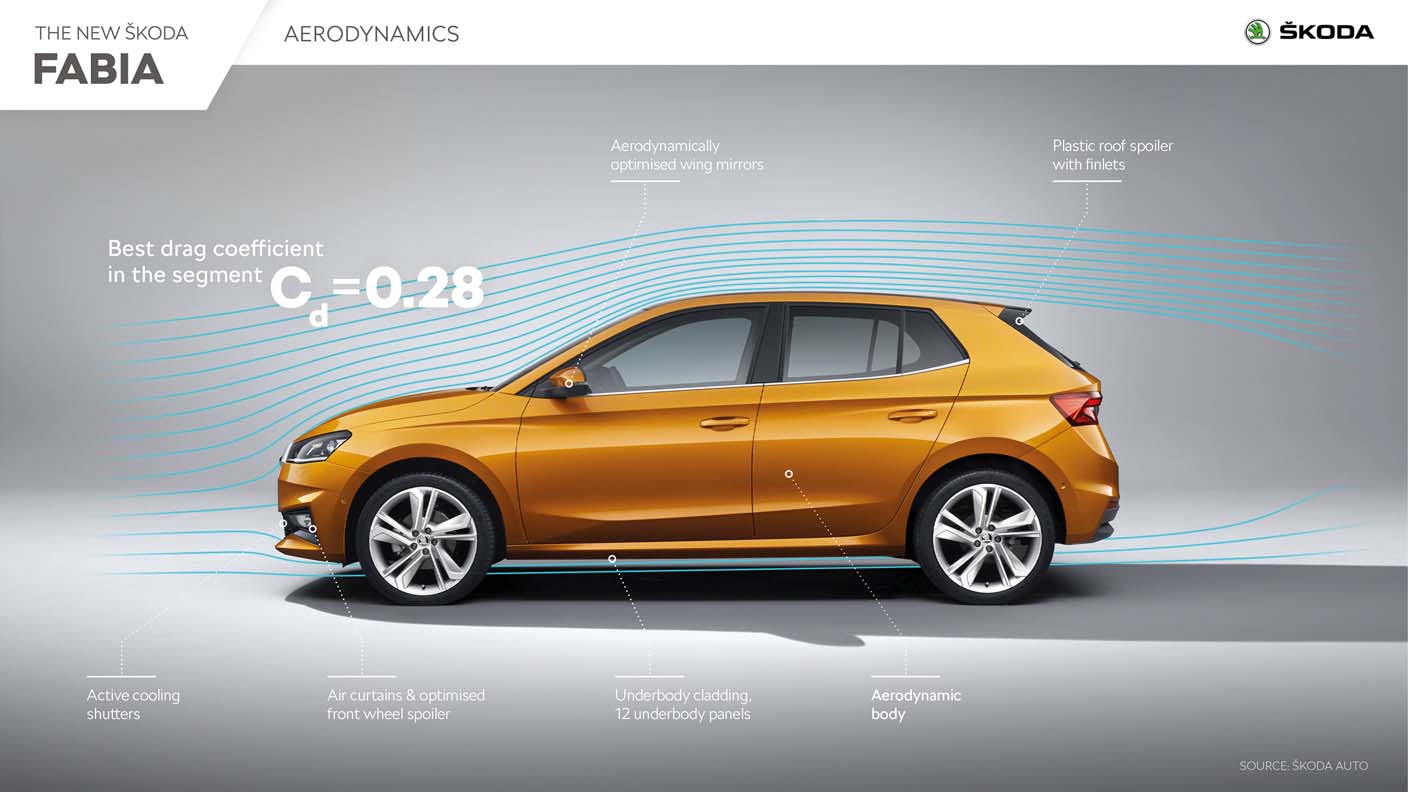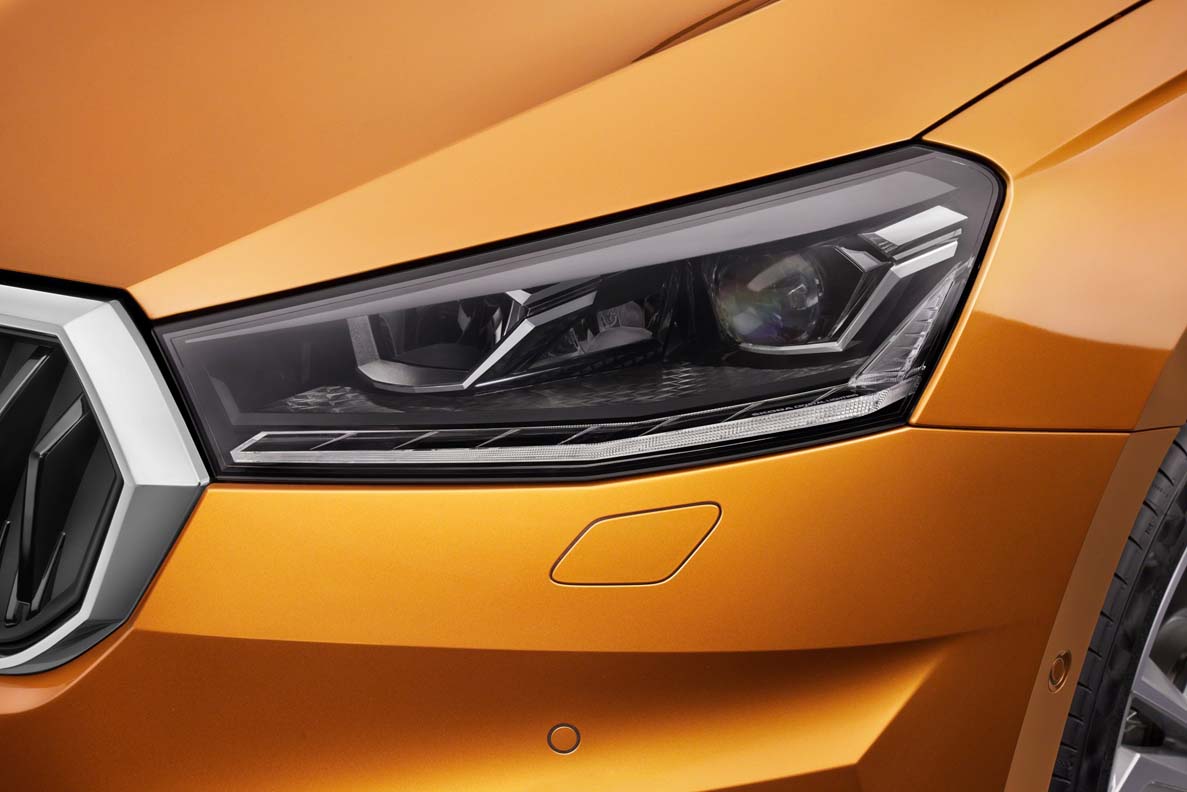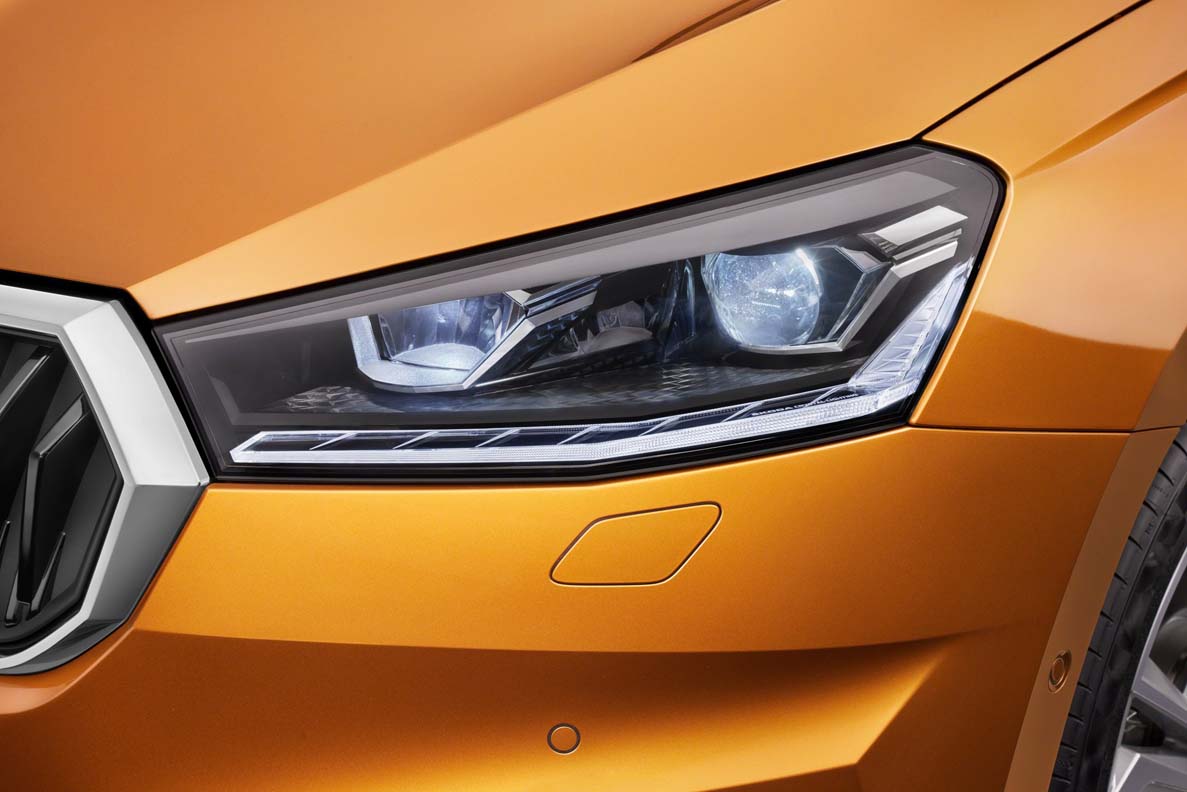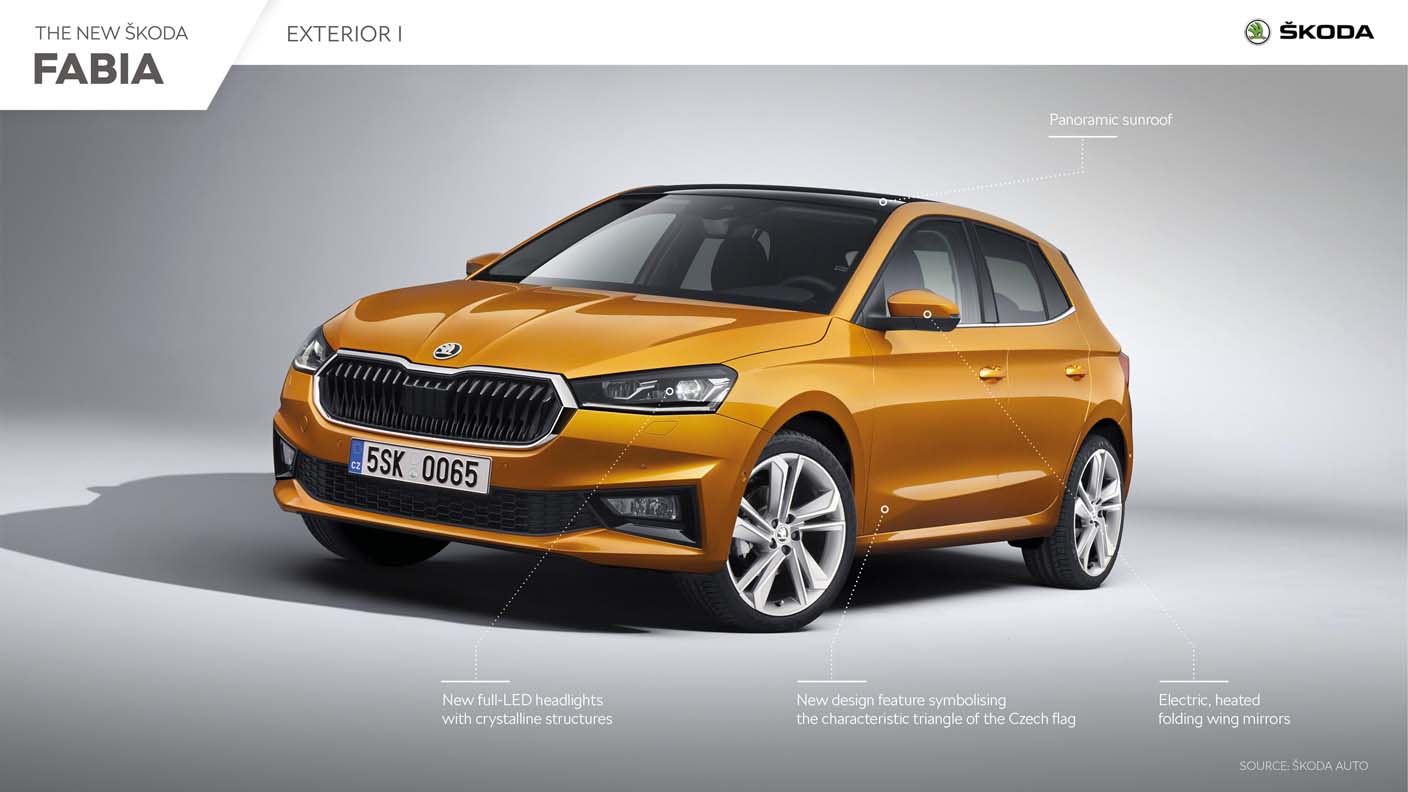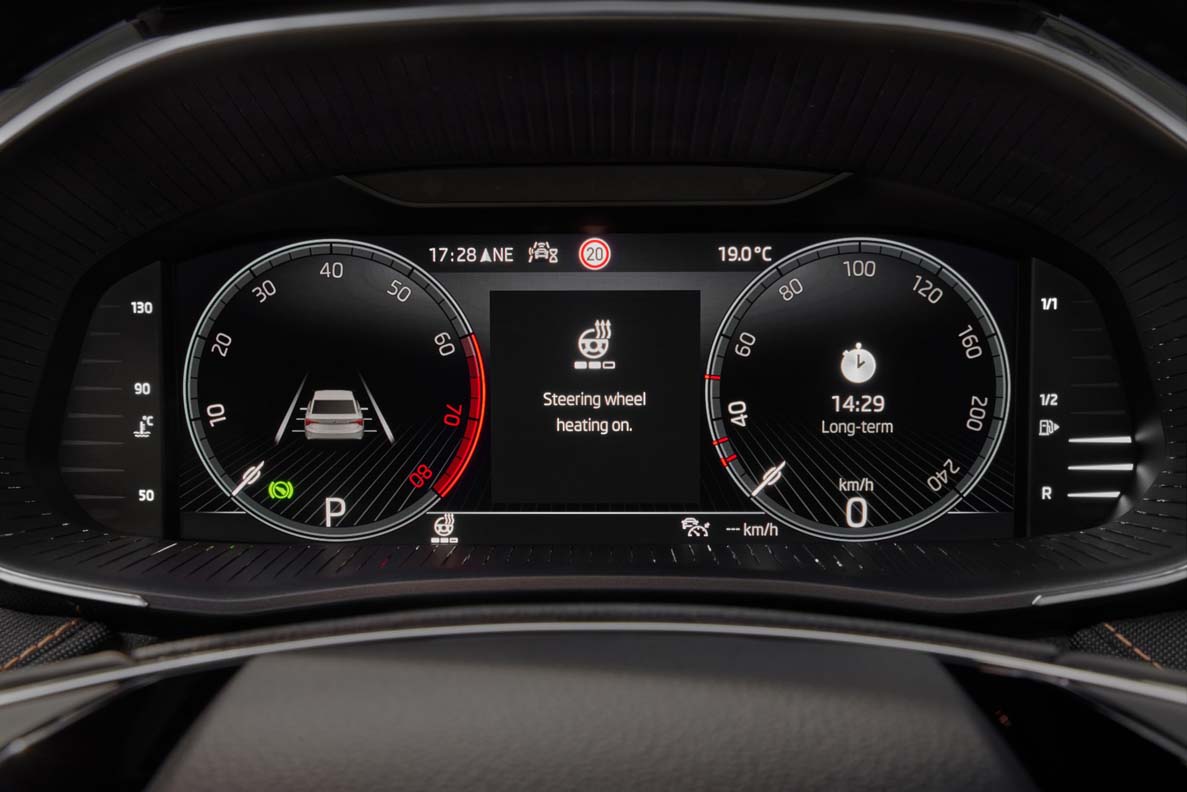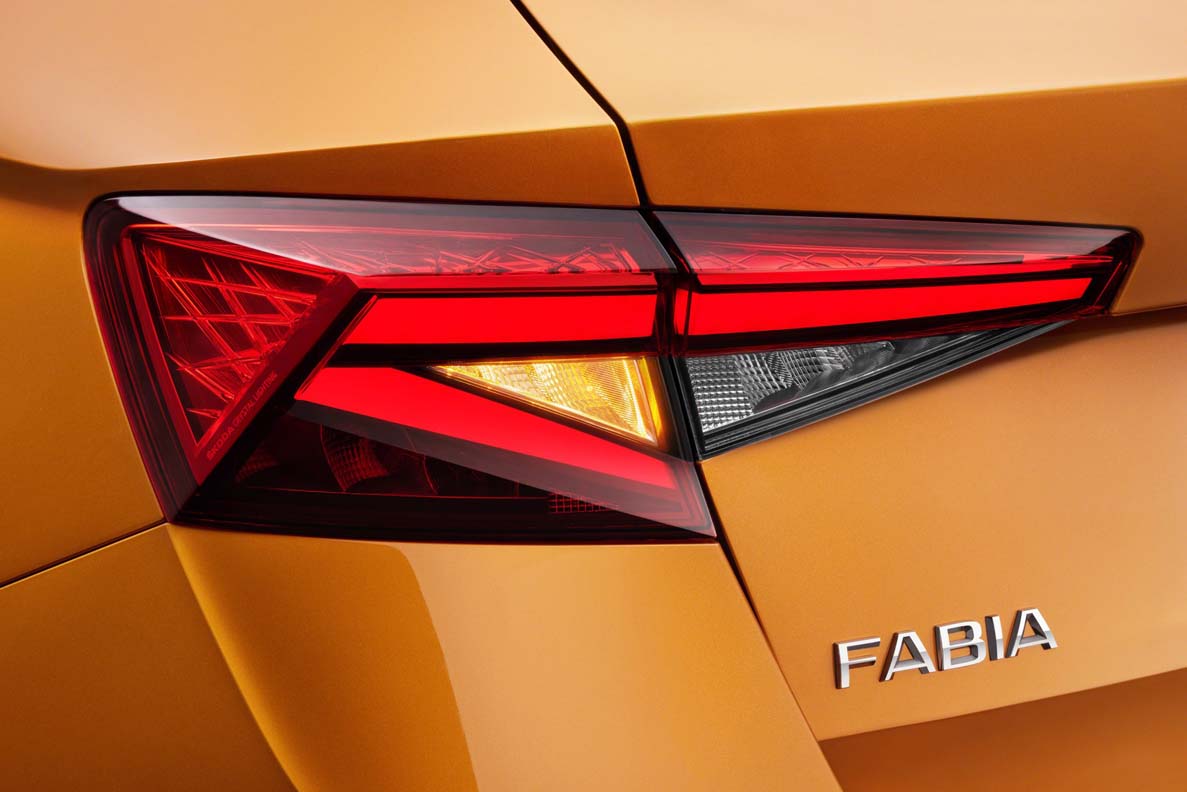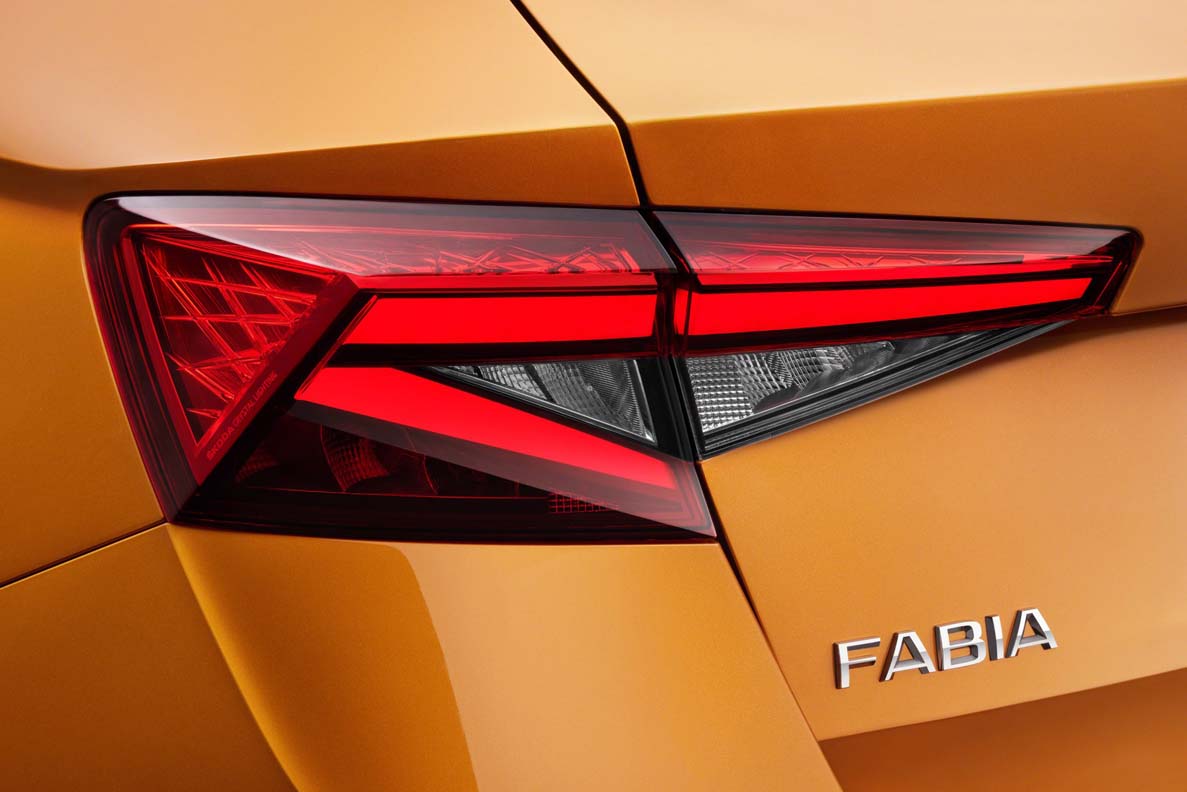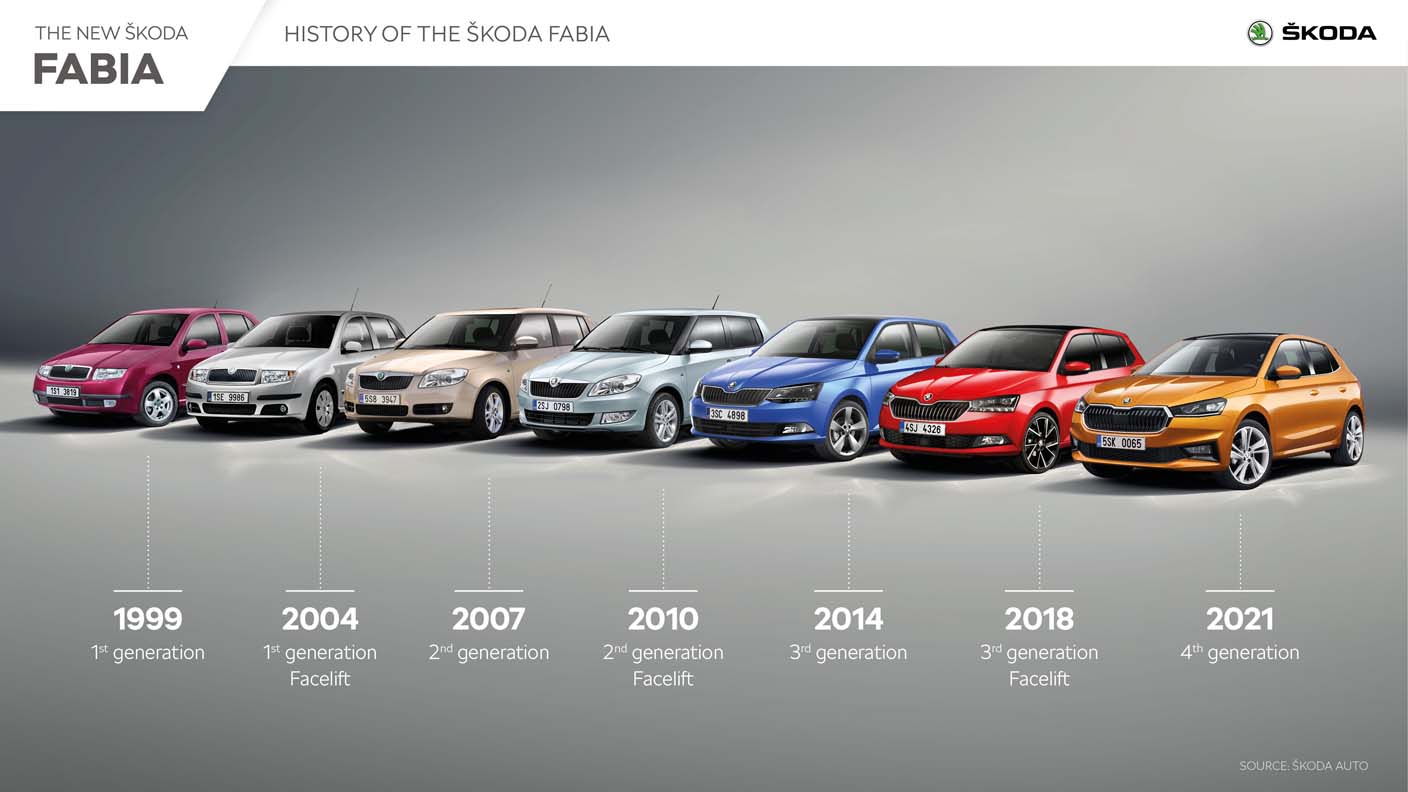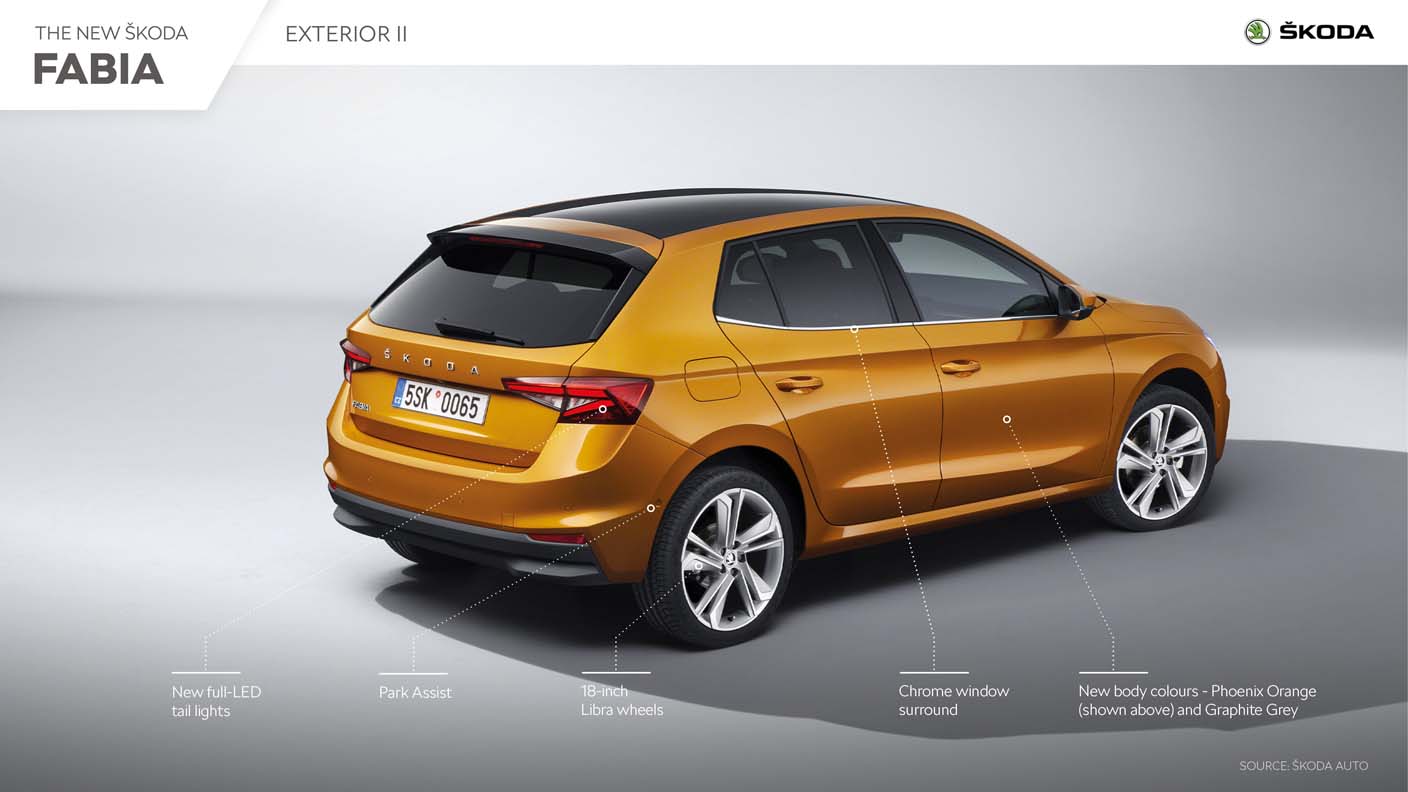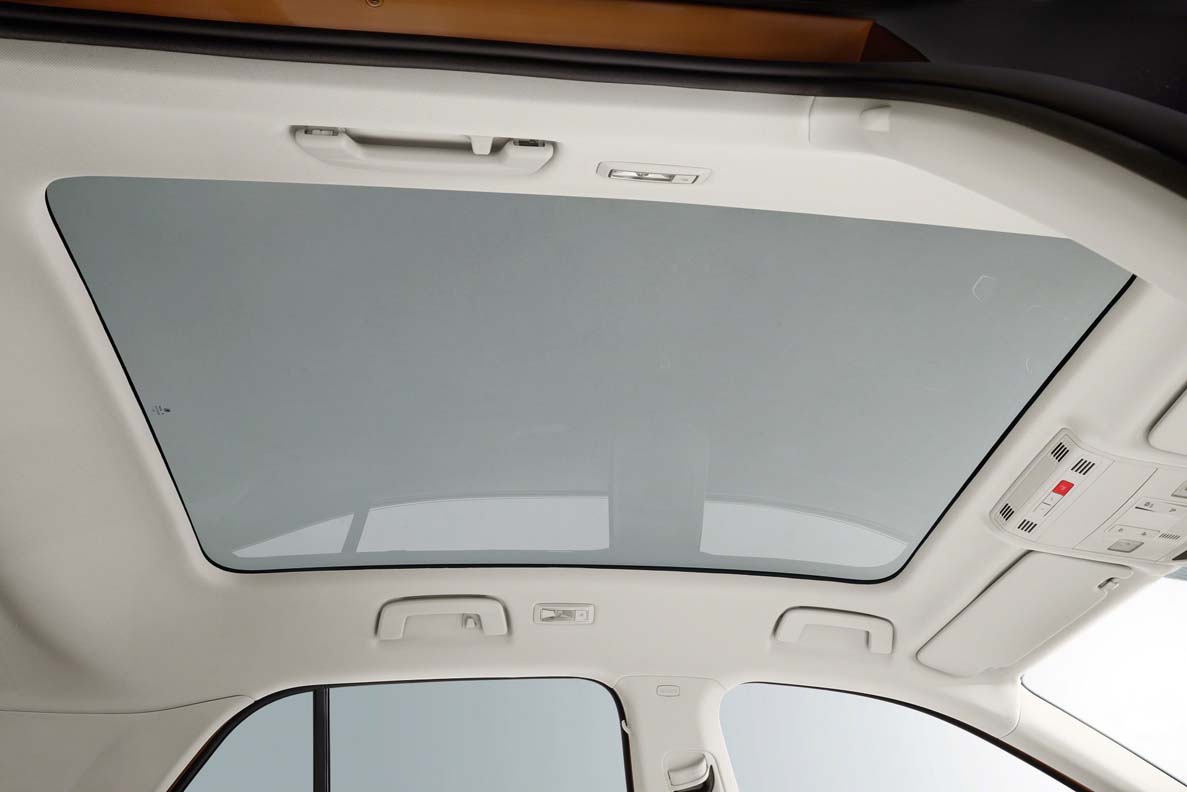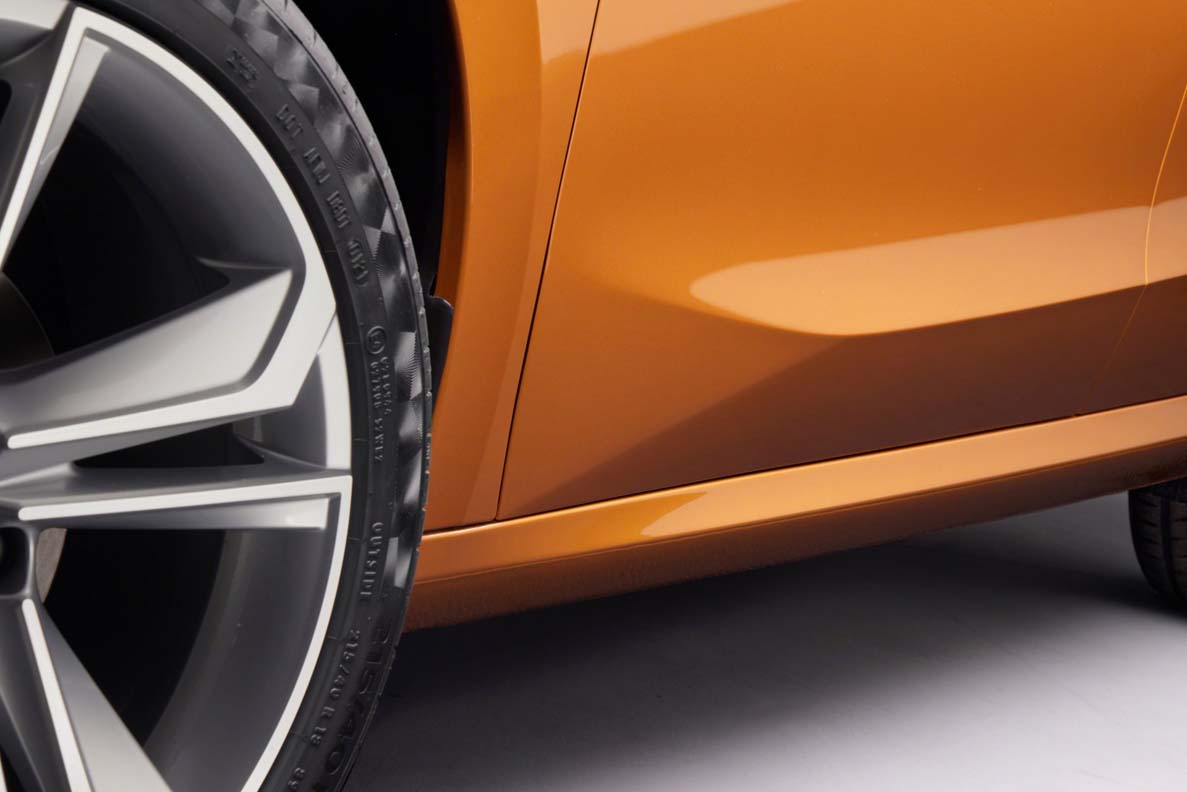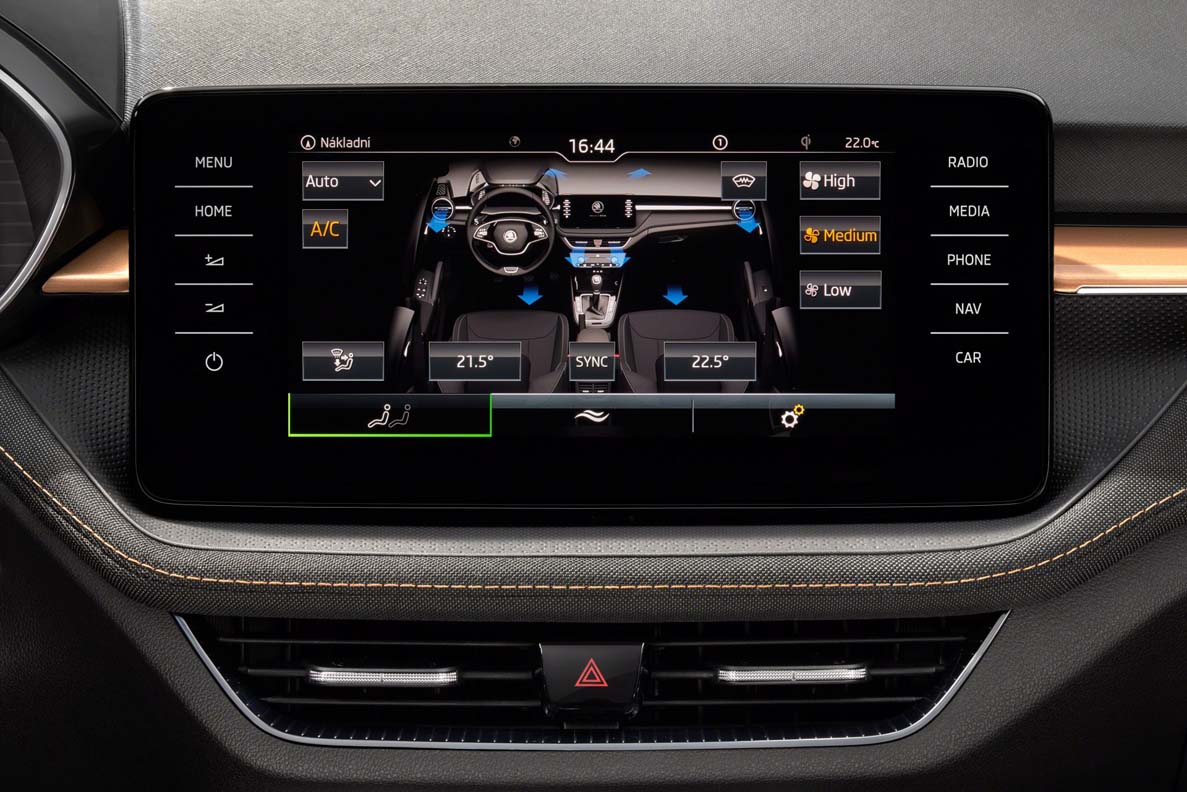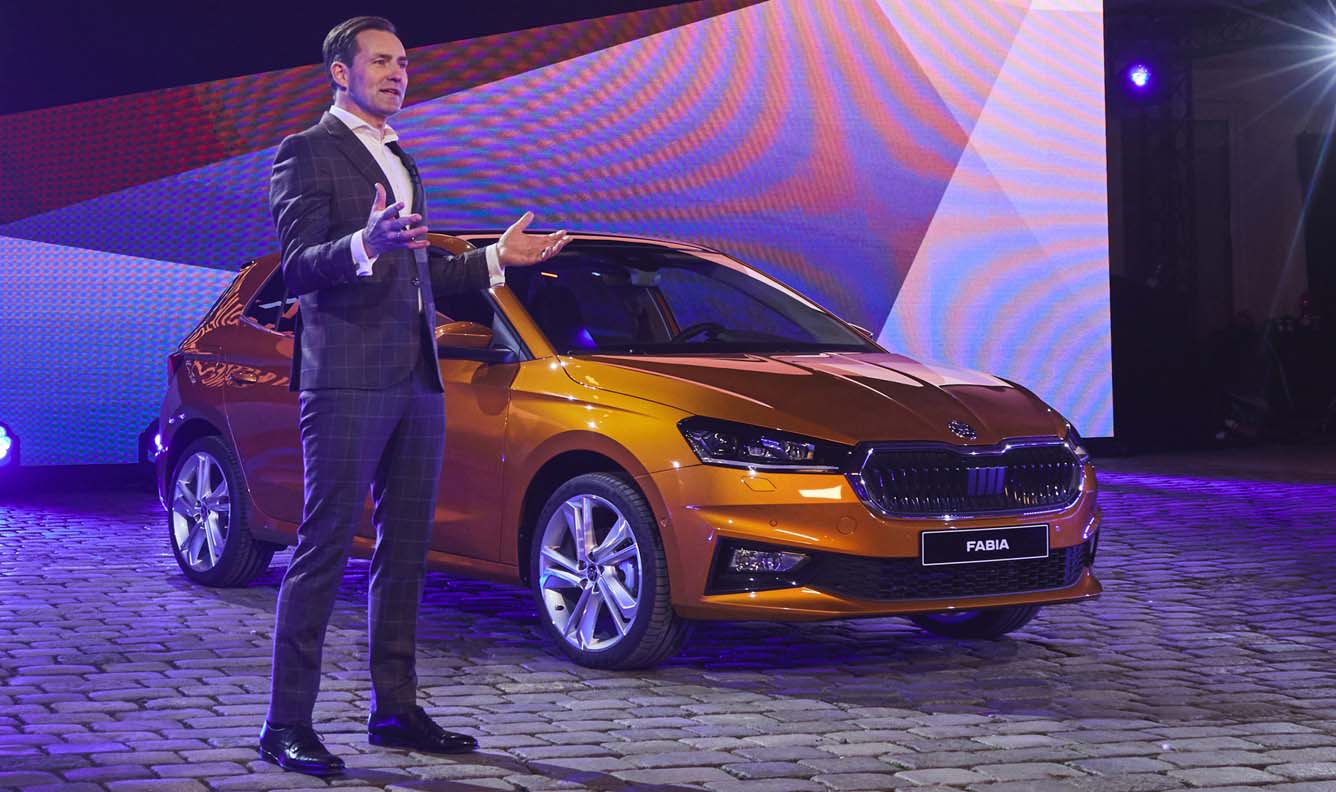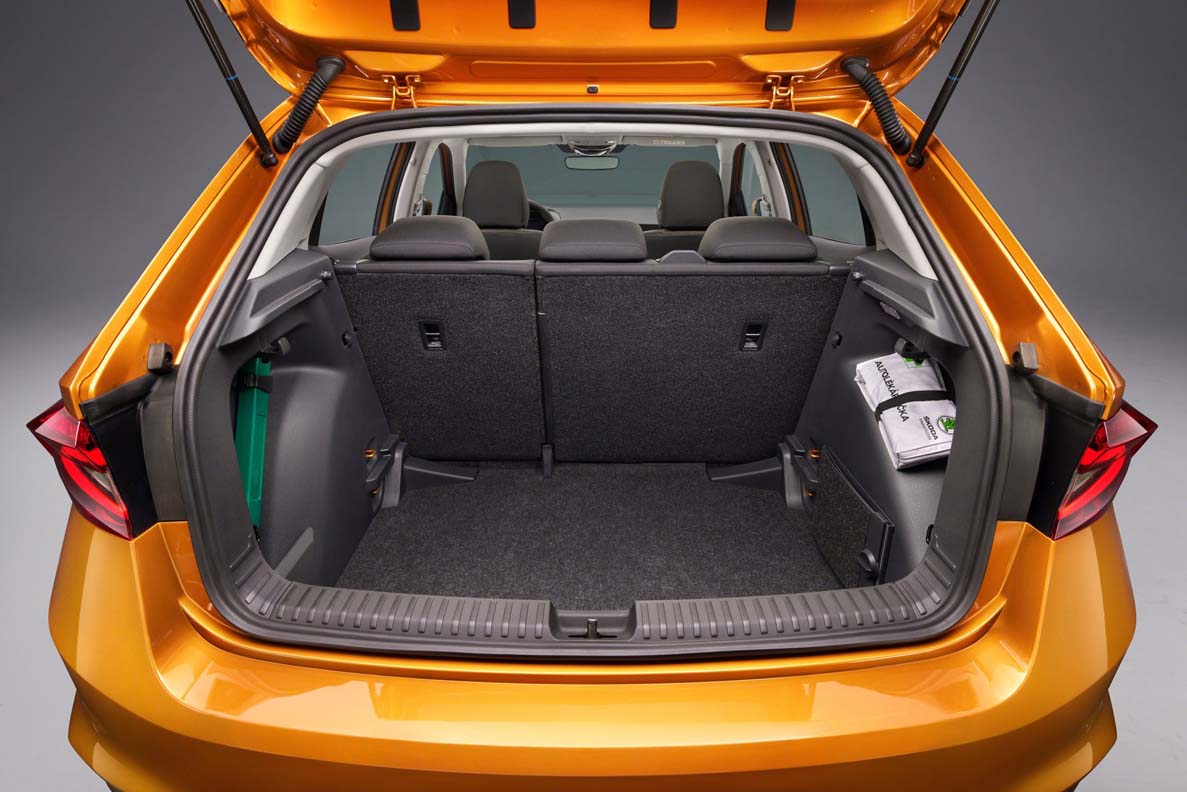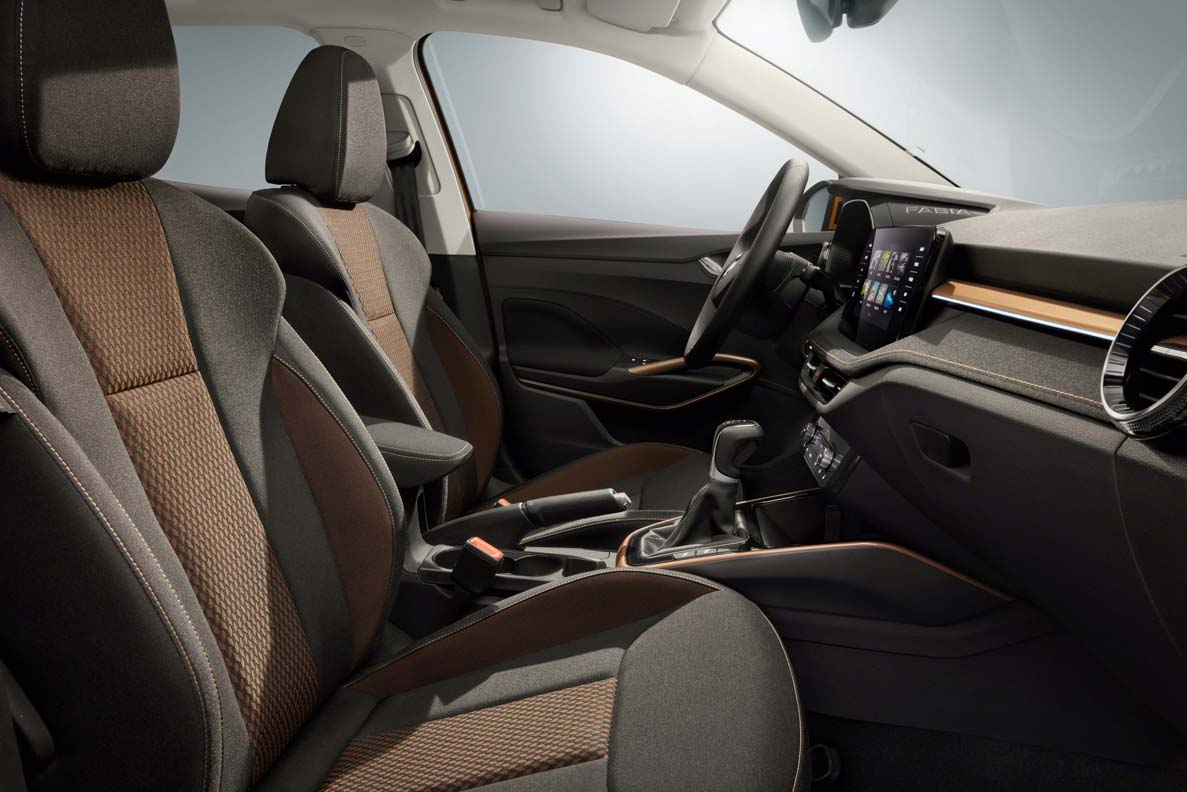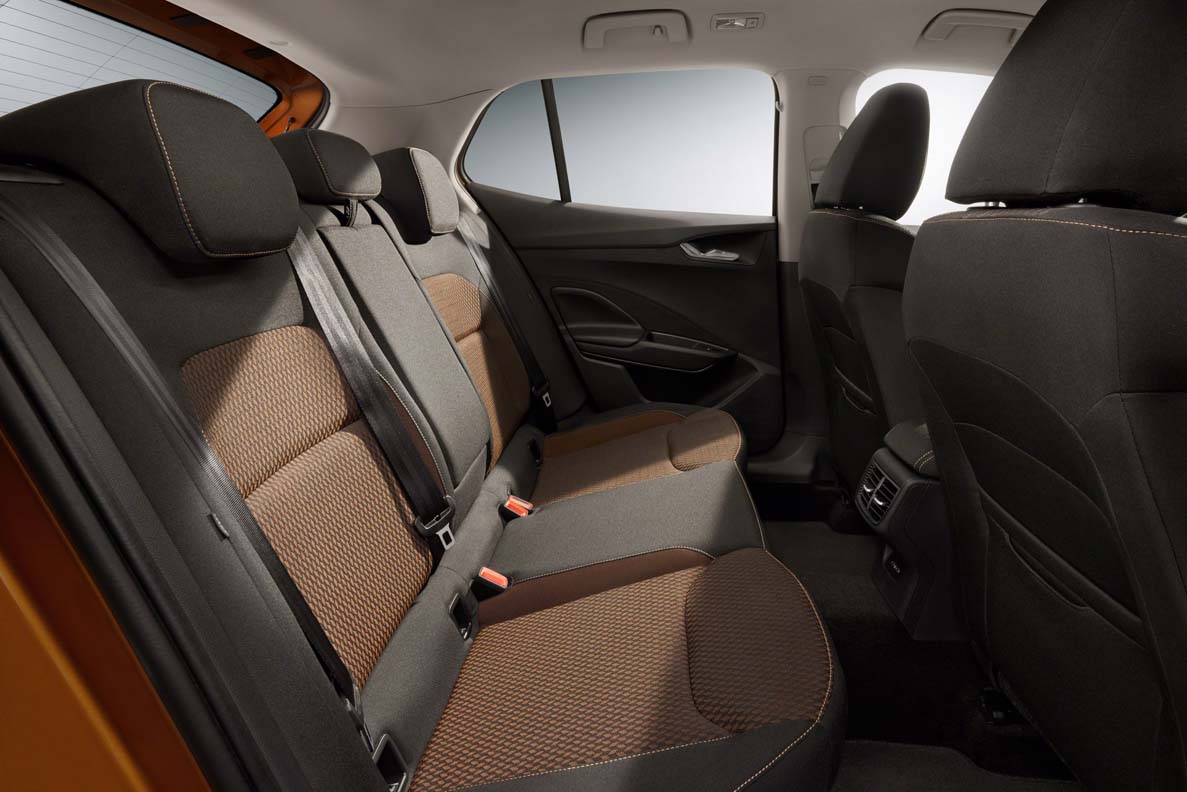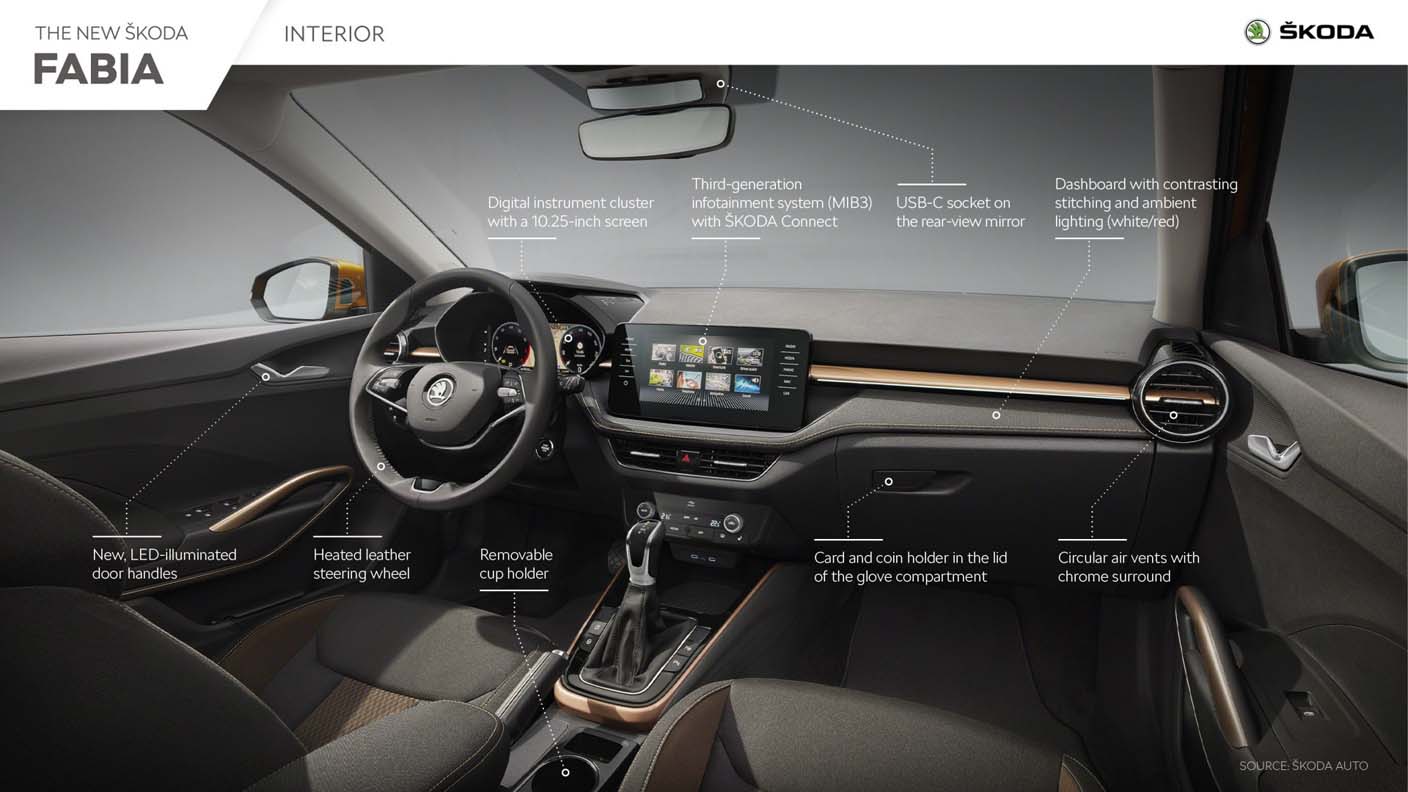
Twenty-two years after the ŠKODA FABIA made its debut, the Czech car manufacturer is lining up the fourth generation of its popular small car. It is now based on Volkswagen Group’s modular MQB-A0 platform and is the most spacious car within its segment, boasting further improved comfort features and numerous advanced safety and assistance systems. Classic and appealing brand qualities, such as value for money, high levels of functionality, and a plethora of Simply Clever features, make the new FABIA a true ŠKODA.
For the first time, the ŠKODA FABIA is based on the modular MQB-A0 platform from Volkswagen Group, which made it possible to make the interior even bigger. Now exceeding the four-metre mark, at 4,108 mm, the new FABIA is considerably longer than its predecessor. The boot – which at 330 l was already the largest in the segment – has gained an additional 50 l to a capacious 380 l. Being based on the MQB-A0, the new FABIA now also boasts many assistance systems that were previously reserved for higher-tier vehicles. In conjunction with the even stiffer body, the small car offers excellent active and passive safety.
Emotive design, best-in-class aerodynamics and a range of more than 900 km
Its emotive design and self-assured proportions make the new ŠKODA FABIA very appealing. Razor-sharp headlights, as well as tail lights with modern LED technology and crystalline structures, emphasise its dynamic appearance. The redesigned interior features a symmetrical dashboard with a free standing central display, an optional digital instrument cluster and horizontal decorative strips. From market launch, the Active, Ambition and Style trim levels will be available. The sporty MONTE CARLO variant will follow later. Five petrol engines from Volkswagen Group’s current EVO generation deliver power outputs ranging from 48 kW (65 PS) to 110 kW (150 PS). With a drag coefficient (cd) of 0.28, the FABIA is the most aerodynamic car in its segment, which – together with an optional 50-litre fuel tank – allows for a range of more than 900 km in the WLTP cycle. Five new Simply Clever features are celebrating their ŠKODA premiere.
Exterior: emotive design and new proportions
Larger, more advanced and more emotive: the fourth generation ŠKODA FABIA has grown and continues the current design language. With athletic proportions, sculptural lines and sharply drawn headlights and tail lights using LED technology, the latest FABIA looks particularly dynamic and emotive. Based on Volkswagen Group’s modular MQB-A0 platform, the car is larger inside and out. Thanks to sophisticated details, such as aerodynamically optimised wheels and actively adjustable cooling shutters in the front bumper’s lower air inlet, the new FABIA achieves a drag coefficient (cd) of 0.28, setting a new record in the small car segment.
Sculptural lines, for example on the bonnet, dynamic proportions and modern light units with LED technology and the ŠKODA-typical crystalline structures create a particularly emotive look. A small design highlight can be found on the front doors: there, body lines stylise the characteristic triangle of the Czech flag. The clear-cut headlights featuring LED technology as standard extend to the ŠKODA grille. The full-LED variants provide more light-intensive low beam and high beam, as well as cornering and adaptive light functions. Full-LED tail lights are another optional extra.
Larger in every aspect
Compared to the first three model generations, the latest ŠKODA FABIA is larger both inside and out, while its weight remains virtually unchanged. At a length of 4,108 mm, it exceeds the four metre mark for the first time. Compared to its predecessor, the new FABIA is 111 mm longer; its wheelbase has increased by 94 mm to 2,564 mm, and at 1,780 mm, it is 48 mm wider. The increased overall dimensions make it possible to offer an even more spacious interior. ŠKODA has also significantly increased the FABIA’s boot, which was already the largest in the segment for the predecessor. The new FABIA now offers 380 l of storage space, which is another 50 l more than before. By folding down the rear seats, the capacity of the boot can be increased to 1.190 l.
Aerodynamics: cd of 0.28 sets benchmark within small car segment
ŠKODA has reduced the new FABIA’s drag coefficient to 0.28 (previous generation: 0.32), setting a record in the small car segment. During the development of the aerodynamics, ŠKODA predominately used what is known as CFD simulations (Computational Fluid Dynamics). Within approximately three and a half years, the ŠKODA engineers computed more than 3,000 of these fluid dynamics simulations.
Cooling shutters reduce fuel consumption by up to 0.2 l per 100 km at 120 km/h

Optimised drag at the rear and FABIA debut for aerodynamically optimised wheels
Approximately one third of a vehicle’s overall drag is caused by turbulence at the rear. The new ŠKODA FABIA has a larger roof spoiler and side finlets that optimise the air flow at the rear. Smaller and specifically designed aerodynamic wing mirror housings additionally reduce drag and direct the air flow to the rear in a targeted manner. At the front, the air is guided to flow through vents in the front bumper, known as air curtains, in a particularly aerodynamic manner close to the side of the body and the wheels. As approximately 25% of the drag is generated by the wheels alone, ŠKODA has now also fitted special plastic trims in the FABIA to improve the alloys’ aerodynamics – this is a first. These trims are suitable for the Proxima and Procyon wheels. Twelve panels now cover a larger part of the underbody instead of three, especially in the areas that are crucial for aerodynamics, such as the engine bay and the axles.
Less noise thanks to aero-acoustic simulations
During the development of the FABIA, ŠKODA used new aero-acoustic simulation methods for the first time to reduce wind noise. Using computations based on CFD simulations, air turbulence and air flow on the body, as well as vibrations on the side windows, can be detected, which can cause whistling noises and increased noise levels in the interior. This allows the sources of noise to be localised and eliminated, for example by adjusting the positioning of the wing mirrors.
New colours and wheels with a diameter of up to 18 inches
There is a choice of nine body colours for the new ŠKODA FABIA, with the two metallic paint finishes Phoenix Orange and Graphite Grey making their debut for the brand and the range respectively. Metallic Graphite Grey and pearl-effect Black Magic can also be chosen as contrasting paintwork for the roof, wing mirror caps and the ŠKODA grille surround. The options for the wheels include 14-inch and 15-inch steel wheels, as well as nine different alloys ranging from 15 to 18 inches. The optional, burnished 18-inch Libra alloy wheels in black are the range-topping variant.
Interior: more space, more comfort features and large displays
The ŠKODA FABIA’s interior strikes a perfect balance between emotiveness and ergonomics. Visually, it is characterised by the free-standing infotainment display measuring up to 9.2 inches. In addition to state-of-the-art infotainment systems, the FABIA can also be fitted with a 10.25-inch digital instrument cluster for the first time. Comfort features as found in higher-tier vehicles, such as a heated windscreen and heated steering wheel, are other options making their FABIA debut. The ŠKODA FABIA will initially be launched with three trim levels.
Owing to the 94-mm-longer wheelbase compared to its predecessor, the new ŠKODA FABIA offers even more space for passengers, especially in the rear. At now 2,564 mm, the small car’s wheelbase is even greater than that of the first-generation ŠKODA OCTAVIA (launched in 1996) which measured just 2,512 mm. The new interior design further improves the FABIA’s feeling of spaciousness, and will be available in the three familiar trim levels – Active, Ambition and Style – at market launch. The symmetrical dashboard with a free-standing central display and the horizontal decorative strips for which there is a choice of six different versions (depending on the trim level) emphasise the width of the interior. From Ambition upwards, the front section of the dashboard is upholstered in fabric with contrasting stitching. Large circular air vents on the right and left – featuring a chrome trim from Ambition upwards – as well as the newly designed door handles, which are also chrome-plated, create new visual touches.
New colours, ambient lighting and comfort features from higher-tier vehicles
Copper-coloured and grey contrasting stitching, as well as decorative trims bring new colour accents to the interior of the ŠKODA FABIA. The new LED ambient lighting (standard in Style) allows the driver to illuminate the decorative trim on the dashboard in white or red. The centre console and front door handles can also be lit up; furthermore, the ambient lighting includes LED reading lights in the front and rear. Newly designed steering wheels provide the finishing touches in the FABIA’s interior. The multifunction steering wheel is available in leather and in a three-spoke sports style, with shift paddles for the DSG. A heated steering wheel as well as a heated windscreen for a clear view and improved safety in winter also make their debut in the range. Such comfort features could previously only be found in higher-tier vehicles.
Digital instrument cluster with five layouts
This is the first-ever ŠKODA FABIA that is optionally available with a digital instrument cluster, which boasts a 10.25-inch digital display. Drivers can choose from different layouts to suit their needs. These include the Classic layout, which is based on the style of analogue round instruments, as well as the Modern, Reduced and Extended layouts. As part of the optional Dynamics pack, there’s a fifth option – the Sport layout, in which the rev counter takes centre stage. The ‘Virtual Cockpit’, as the digital instrument cluster is also referred to, can display radio station emblems, covers of music albums and stored pictures of callers, among other things. Furthermore, the map can zoom in on junctions and display them in a separate window. As standard, the FABIA comes with an analogue instrument panel and a 3.5-inch information screen.
Available for the first time: dual-zone Climatronic
ŠKODA’s latest generation of its small car is the first FABIA that can be ordered with a dual-zone Climatronic, as well as air vents on the rear of the centre console to keep rear passengers cool. When equipped with this optional air conditioning system, the centre console features two rotary knobs to allow the temperature to be regulated separately for the right- and left-hand sides of the vehicle. All of the system’s functions can be intuitively operated using eight buttons.
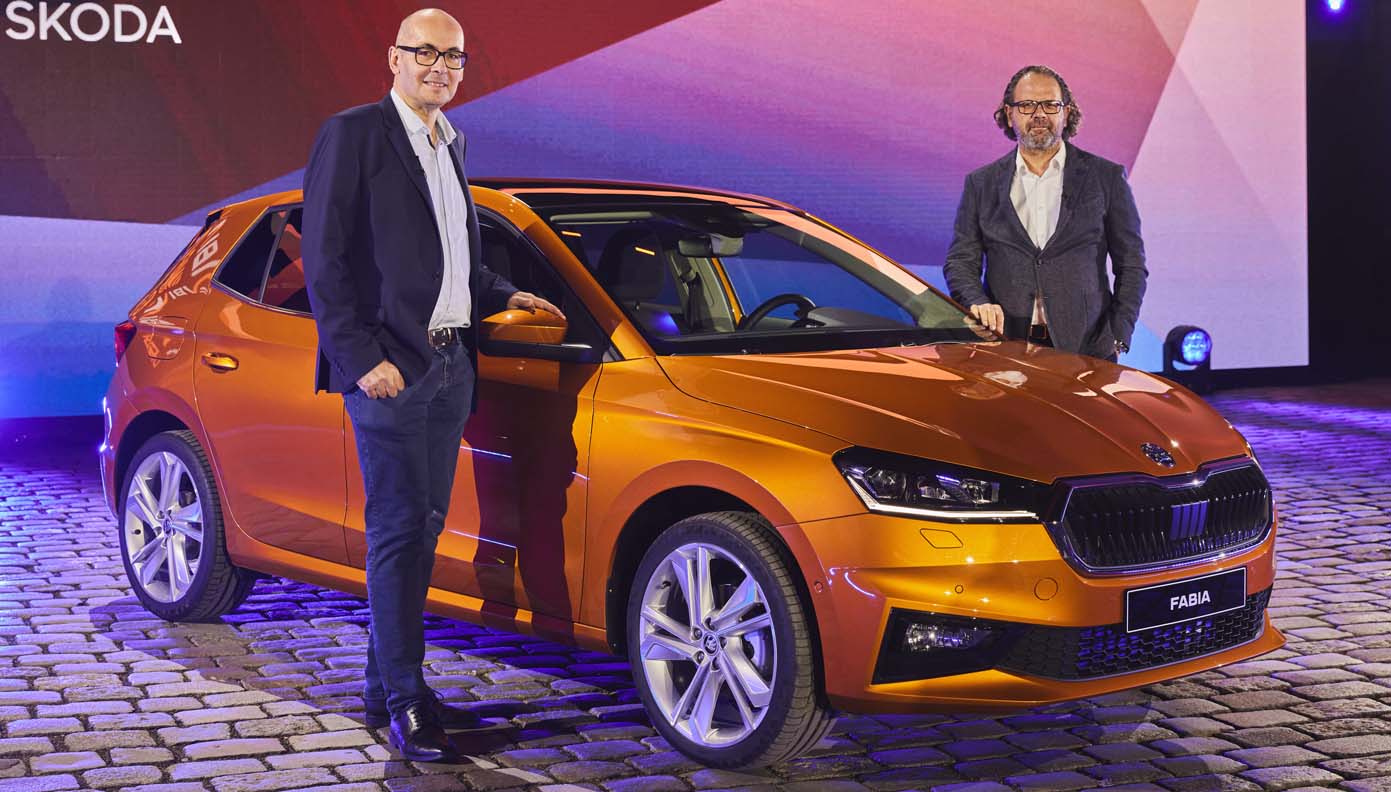
Connectivity: always online and wirelessly networked
ŠKODA has equipped the new FABIA with infotainment systems that feature screens of up to 9.2 inches. The small car is always online thanks to a built-in eSIM. This makes it possible to receive internet radio or to access the wide range of ŠKODA Connect mobile online services and the latest infotainment apps. Smartphones can be connected to the car via Wireless SmartLink without the need of a cable and inductively charged in the Phone Box. Amundsen, the top-of-the-range infotainment system, can also be operated by gesture control and the Laura digital voice assistant.
For the new ŠKODA FABIA, there is a choice of three different infotainment systems. Swing, the entry-level system, features a modern 6.5-inch colour touchscreen, a radio with digital DAB receiver and four front speakers as standard. Bolero offers a radio, an 8-inch screen, a Bluetooth hands-free system and two additional surround-sound speakers in the rear doors. A smartphone can be connected without the need of a cable via Wireless SmartLink and Android Auto or Apple CarPlay, while the optional Phone Box enables inductive charging.
Range-topping system Amundsen with online-backed navigation and voice control
The Amundsen infotainment system features a customisable 9.2-inch display, and a navigation function that is backed by online data. This option also includes a Wi-Fi hotspot. Music streaming services can be accessed via a paired smartphone. Maps can be stored on the 64-GB SSD hard drive and updated online. The gesture control feature comes as standard, while online-backed voice control via the Laura digital voice assistant, who understands 15 languages, is optional. The new FABIA boasts up to five USB-C sockets for charging further mobile devices – one of which can be found on the rear-view mirror to charge a dashcam, for example. The ŠKODA Sound System, with an additional amplifier and a subwoofer in the boot, is an optional extra providing even better acoustics.
Infotainment apps for weather, news, calendar and traffic alerts
The customer can create a ŠKODA Connect account or transfer an existing account to the FABIA directly via the Amundsen system’s display. The new infotainment apps are just as easy to download. They offer weather reports and news, allow access to a personal Google calendar or warn of hazards. The Amundsen system also enables a wealth of mobile online services from ŠKODA Connect to be used. These include eCall, which automatically calls for emergency assistance in the event of an accident, Proactive Service (breakdown call), and remote vehicle access via the MyŠKODA app and the ŠKODA Connect web portal.
Safety: new assistance systems and up to nine airbags
Boasting up to nine airbags, the new ŠKODA FABIA is one of the safest small cars on the market. As a result of the FABIA now being built on the modular MQB A0 platform, its active and passive safety features have been further improved, including by assistance systems that were previously reserved exclusively for higher-tier vehicles. Travel Assist and Park Assist, for example, make their FABIA debut.
The carmaker is fully exploiting the possibilities Volkswagen Group’s modular MQB-A0 platform has to offer, and has further optimised the small car in terms of active and passive safety. A robust body structure with high degree of torsional stiffness provides the technical basis. A high proportion of high-strength, ultra-high-strength or specially hardened hot-formed steels ensures great stability. In addition, the MQB-A0 makes it possible to use advanced assistance systems from higher-tier vehicles.
Safe journeys with Travel Assist, more comfort thanks to Park Assist
This is the first FABIA that can be equipped with Travel Assist, which provides automatic support with longitudinal and lateral steering. This can be activated at the touch of a button and combines several assistance systems at the same time. Up to 210 km/h, Adaptive Cruise Control (ACC) automatically adjusts the speed of the car to that of vehicles ahead. Lane Assist, as the name suggests, helps to keep the FABIA in lane by performing corrective steering inputs if needed. Using Hands-on Detect, Travel Assist checks whether the driver touches the steering wheel consistently. The improved Blind Spot Detect (Side Assist) is another option. This warns the driver of vehicles that are up to 70 m away and wanting to overtake or that are in the car’s blind spot. The FABIA can now also lend the driver a hand when parking: Park Assist works at speeds of up to 40 km/h displaying suitable parallel and bay parking spaces and, if desired, taking over the driver’s steering work when parking. Manoeuvre Assist uses sensors to detect an obstacle in front of or behind the car during parking and applies the brakes automatically. Traffic Sign Recognition and Front Assist with Predictive Pedestrian and Cyclist Protection are also new features for the FABIA.
Up to nine airbags protect occupants in the event of an accident
The new FABIA comes with airbags for the driver and front passenger, curtain airbags, and front side airbags as standard. A knee airbag for the driver and rear side airbags are optional extras to further enhance safety. ISOFIX anchors and top tether anchor points on the back seats are part of the standard equipment and are optional on the front passenger seat. The top tether eyelets on the front passenger’s backrest and on the outer seats in the rear mean that the FABIA can accommodate three securely fastened child seats.
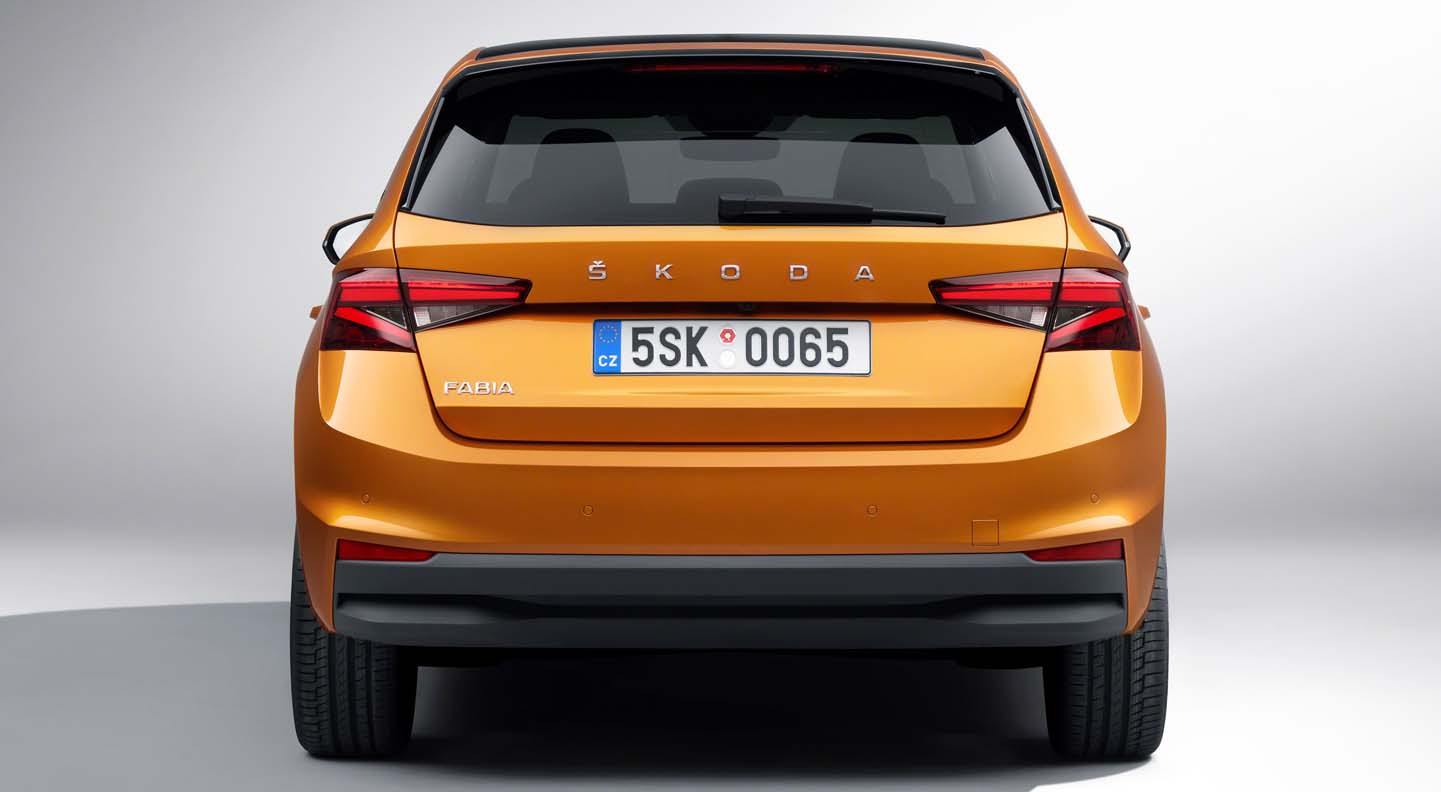
Engines: lower fuel consumption, greater mileage
More choice and a greater range of power outputs: there are far more powertrain variants to choose from in the fourth-generation ŠKODA FABIA than in its predecessor. ŠKODA offers five engines from Volkswagen Group’s latest EVO generation for the small car. All engines comply with the stringent Euro 6d emissions standard; the power outputs range from 48 kW (65 PS) to 110 kW (150 PS). Four of the five engines, in conjunction with the optional 50-litre fuel tank, can cover more than 900 km in the WLTP cycle.
All engines fulfil the Euro 6d emissions standard. The 1.5 TSI with a power output of 110 kW (150 PS) and a 7-speed DSG as standard is the latest top-of-the-range powertrain variant. The models delivering up to 70 kW (95 PS) are fitted with a 5-speed manual gearbox, while there is a choice of a 6-speed manual gearbox and an automatic 7-speed DSG for the 1.0 TSI producing 81 kW (110 PS).
More power for the MPI engines developed by ŠKODA AUTO
ŠKODA offers two multi-point injection petrol engines to choose from for the entry-level FABIA, which is a front-wheel drive. These 1.0 MPI three-cylinder engines have a displacement of one litre and generate 48 kW (65 PS) and 59 kW (80 PS) respectively. This is 4 kW (5 PS) more than the engines of the previous generation. Both engines were developed by ŠKODA AUTO and are produced in the Czech Republic.
Innovative plasma coating reduces fuel consumption and emissions
The two direct-injection 1.0 TSI engines feature plasma-coated cylinder blocks that replace the cast-iron cylinder liners, which reduces internal friction in the three cylinders. This lowers fuel consumption, emissions and, by better distribution and dissipation of heat in the combustion chamber, the thermal load on the engine. The thin, powder-coated layer measures just 150 μm (0.15 mm).
New top-of-the-range engine with active cylinder technology
The 1.5 TSI four-cylinder, with a power output of 110 kW (150 PS), is the new range-topping engine for the FABIA. Its active cylinder technology (ACT) reduces fuel consumption as well as CO2 emissions. When engine load is low, the system automatically, and virtually without the driver noticing, shuts down two cylinders. All TSI engines available for the ŠKODA FABIA have a petrol particulate filter.
Low fuel consumption makes for great mileage
In conjunction with the optional 50-litre fuel tank instead of the standard 40-litre tank, the three cylinder engines can cover more than 900 km in the WLTP cycle.
Simply Clever: five new features in the new FABIA
With five all-new features and eight making their FABIA debut, the Czech carmaker is continuing its tradition of offering brand-typical Simply Clever solutions in the fourth generation of its popular small car. Depending on the specification, the new ŠKODA FABIA offers a total of up to 43 practical details that make the vehicle easier to use in everyday life – that’s more than ever before. The range extends from ŠKODA classics, such as the ice scraper in the fuel filler flap with a tyre tread depth gauge, the car park ticket holder on the A-pillar and an umbrella in the driver’s door, to all-new clever details that make the interior and boot much tidier with very little effort.
For many years, ŠKODA has been making everyday use of a car that little bit easier for its customers with a constant stream of new and ingenious Simply Clever features. The new FABIA offers no fewer than five new details making their ŠKODA debut. In the storage compartment in the centre console, for example, a new clip for a credit card or car park ticket and an elastic band as a pen holder keep things tidy. A removable cup holder between the front seats is an optional extra to provide more flexibility, while a box on the transmission tunnel offers rear passengers a clever storage option for small items. The box just needs to be placed between the centre console and the rear seats and then locks itself into place. A flexible storage compartment for the boot is another feature to choose from. This saves space by being located on the side wall, and can be pulled out to secure items if required. The fifth solution to premiere is the sun visor, available as an accessory for the optional panoramic roof. When not in use, it easily folds to a third of its size and can be stored under the boot cover.
Smartphone storage pockets, and USB-C socket on the rear-view mirror
Some Simply Clever solutions that are already well-known from other ŠKODA models are now also available for the FABIA. This includes, for example, a multifunction storage pocket that attaches below the boot cover. This converts an otherwise mostly unused space into a perfect storage area for coats or jackets, and can accommodate items weighing up to 3.5 kg. The easy-to-reach smartphone storage pockets on the front seatbacks as found in the OCTAVIA and ENYAQ iV are further details to make their FABIA debut. The folding backrest of the front passenger seat is another addition to the range, as is the USB-C socket on the rear-view mirror. This is available as an option for the Style trim level and can be used to power a dashcam, for example, without a dangling cable obstructing the driver’s view.
